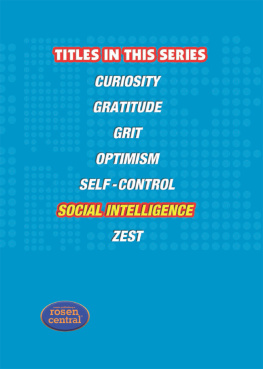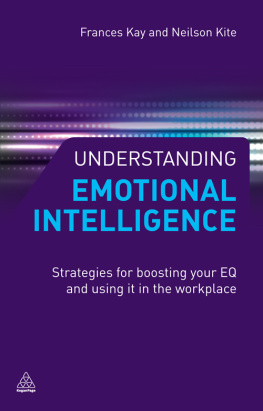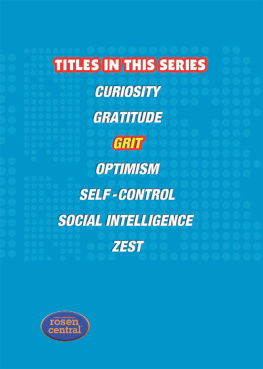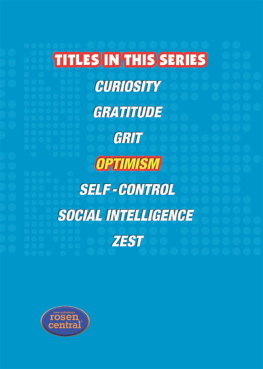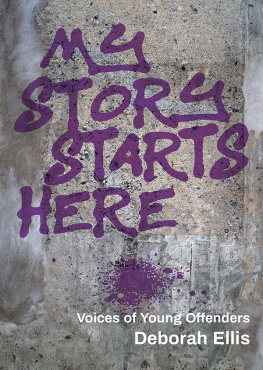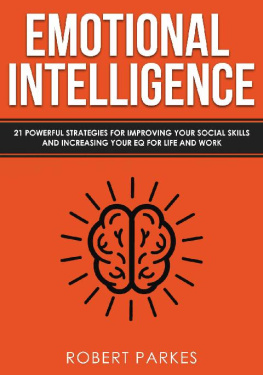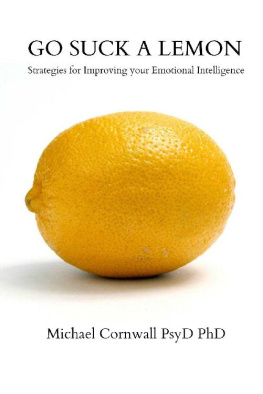Published in 2014 by The Rosen Publishing Group, Inc.
29 East 21st Street, New York, NY 10010
Copyright 2014 by The Rosen Publishing Group, Inc.
First Edition
All rights reserved. No part of this book may be reproduced in any form without permission in writing from the publisher, except by a reviewer.
Library of Congress Cataloging-in-Publication Data
Kaplan, Arie.
Social intelligence/by Arie Kaplan.
p. cm.(The 7 character strengths of highly successful students)
Includes bibliographical references and index.
ISBN 978-1-4488-9552-6 (library binding)ISBN 978-1-4488-9565-6 (pbk.) ISBN 978-1-4488-9566-3 (6-pack)
1. Social intelligenceJuvenile literature. 2. Social skillsJuvenile literature.
3. Social skills in childrenJuvenile literature. I. Kaplan, Arie. II. Title. BF723.S62 K365 2014
302.2d23
Manufactured in the United States of America
CPSIA Compliance Information: Batch #S13YA: For further information, contact Rosen Publishing, New York, New York, at 1-800-237-9932.
CONTENT
CHAPTER 1
WHAT IS SOCIAL INTELLIGENCE?
CHAPTER 2
THE FLIP SIDE OF SOCIAL INTELLIGENCE: SHYNESS AND SOCIAL ANXIETY
CHAPTER 3
HOW SOCIALLY INTELLIGENT ARE YOU?
CHAPTER 4
STRIKING A SOCIALLY INTELLIGENT BALANCE
CHAPTER 5
SMART STRATEGIES FOR BOOSTING YOUR SOCIAL INTELLIGENCE
INTRODUCTION
H ave you ever seen another person across the room at a party and thought, I wonder what her deal is? You go over to talk to her and you find yourself thinking, Shes fascinating! By the end of the evening, youve made a new friend.
Well, did you know that what you just did was one of the most human things you could possibly do? Thats because you were exhibiting social intelligence. Social intelligence is the ability to get along well with others and for them to get along well with you. Its often referred to simplistically as people skills, but its a bit more complex than that. Social intelligence involves the ability to read people. Social intelligence makes you aware of the social dynamics that govern various situations. It helps you to come up with effective strategies that can help you achieve your goals in dealing with others.
It was once thought that peoples intelligence could be most accurately measured via a simple numberthe IQ score, which stood for intelligence quotient. According to Professor Howard Gardner of Harvard University, however, intelligence is multidimensional. This means that there are many different key dimensionsor types of intelligence that can continue to increase throughout ones life. This potential increase in various kinds of intelligence is influenced by the various experiences, growth opportunities, and challenges one goes through. One of these key dimensions is social intelligence. Gardners theory has gained much support over the past couple of decades. Many other academics, authors, and medical professionals have embraced the idea of social intelligence.

The more you are able to understand and respect the needs, wants, and feelings of other people, the more successful your interactions will be. If you develop social intelligence, you will also develop a large circle of very good friends.
The concept of social intelligence has changed the way we think about our interactions with one another. Weve discovered thatas humanswere wired to connect. The very design of our brains makes them naturaland very powerfulsocial networking tools. Whenever we talk to another person, we are instantly drawn into a brain-tobrain link.
The wonderful thing about your level of social intelligence is that its not set in stone. You can increase it, expand it, enhance it, and sharpen it. And by doing so, you can improve your relationships with your parents, your friends, your peers, your classmates, your coworkers, and your girlfriend or boyfriend. You can literally improve your life.
CHAPTER 1
WHAT IS SOCIAL INTELLIGENCE?
I n Daniel Golemans book Social Intelligence, the author relates the story of Layne Habib, whose teenage daughter once called a middle-aged woman old. Habib had to explain to her daughter why the middle-aged woman didnt want to hear that. Her daughter has Aspergers syndrome, which is a developmental disorder that affects ones ability to socialize and communicate successfully with others. Children who have Aspergers syndrome usually exhibit signs of social awkwardness, the expressing of blunt and unfiltered thoughts, and an obsessive fascination with specific topics.
Because she has Aspergers syndrome, Habibs daughter has little grasp of social cues. On another occasion, she taught her daughter that she should wait for a pause to end a conversation, instead of simply proclaiming, I feel like leaving now, and abruptly walking off. Her daughter then understood that sometimes, during a conversation, you have to pretend to be interested in what the other person is saying. As Habib told Goleman about her daughter, She needs to learn the little white lies to use so as not to hurt another persons feelings.
These teens are playing a game that helps them develop sportsmanship and cooperation skills as part of a program called PEERS that helps autistic kids build social skills.
Habib continually teaches her daughter social strategies like this. She does it in a step-by-step manner, on a case-by-case basis, as new social challenges and situations arise. What shes doing, in the long run, is enhancing her daughters social intelligence skills. In her professional life, Habib also teaches social skills to special needs children whose challenges are similar to those of her daughter. Mastering these social strategies helps them join the world, as she puts it.
But dont we all have to learn strategies so that we can join the world? Habibs daughter might simply represent an extreme version of the education and training that we all need to develop social intelligence and function socially in the world at large. The way we acquire and practice social intelligence is, in the end, similar in kind (if not in degree) for all of us.
INTERPERSONAL SMARTS
Ever notice how some people are really good at reading other people theyve just met for the first time? They have enhanced social intelligence skills. At its most basic level, social intelligence is the ability to work well with others. Simply put, its a knack for understanding people.
Lets say you and your friend Jen have just sat down to lunch in the school cafeteria. A new girl whos just been transferred to your school is nervously scouring the area trying to find a place to sit. Jen motions for the new girl to come over and join you. They start talking, and the new girls nervousness vanishes. Shes completely at ease. Youre dumbfounded; how did Jen do it? It looks like she has established some psychic rapport with this girl! Jen simply shrugs: Im good at reading people, thats all. What Jen really means is that she has an awareness of peoples stated (and unstated) goals, hopes, fears, wants, and needs.

